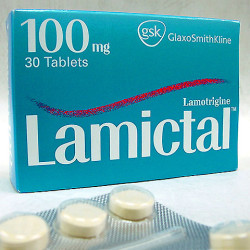 Lamotrigine, known by the brand name Lamictal, is an anticonvulsant drug that was initially approved in 1994 to treat seizure disorders. In 2003, the FDA approved the drug to treat bipolar disorder as well.
Lamotrigine, known by the brand name Lamictal, is an anticonvulsant drug that was initially approved in 1994 to treat seizure disorders. In 2003, the FDA approved the drug to treat bipolar disorder as well.
Additionally, this medication was also used off-label to treat major depression, post-traumatic stress disorder (PTSD) and borderline personality disorder (BPD).
The drug has reportedly been a very helpful medication for certain individuals who have been unresponsive to other mood-stabilizing medications.
Lamotrigine Side Effects
As with any medication, Lamotrigne (Lamictal) comes with a set of potential side effects that can occur with use. As far as mood stabilizing drugs go, lamotrigine is considered to have a mild side effect profile and is a preferred drug for some for that very reason.
Commonly reported Lamotrigine side effects include:
- Blurred vision
- Dizziness
- Double Vision
- Headache
- Nausea
- Rash
- Sleepiness
- Unsteadiness
- Vomiting
These Lamotrigine side effects commonly overlap with many pharmaceutical medications, and may disappear once the body has gone through an adjustment period after starting the medication.
Lamotrigine Rash
While a lamotrigine rash may be common and transitory in nature, without too much cause for concern, a lamotrigine rash can also be potentially life-threatening. Some rashes may appear like a mild sunburn, and some may appear like a severe case of poison ivy.
Because of the inability to know if the rash is just a typical rash or if it something more severe, ALL rashes should be immediately reported to the physician who prescribed lamotrigine.
According to reports, about one in ten users of Lamictal will develop a mild rash. However, about one in one thousand will develop a severe rash that is part of an allergic reaction to lamotrigine.
This allergic reaction to lamotrigine may start out as a run-of-the mill mild reaction but can quickly progress to a life-threatening condition and called Stevens Johnson Syndrome.
Stevens Johnson Syndrome and Lamotrigine
Stevens Johnson Syndrome (SJS) is an allergic reaction to lamotrigine and other over-the-counter and prescription drugs found on the market. While nearly all cases of Stevens Johnson Syndrome are caused by an allergic drug reaction, some cases have also been linked to some infections such as herpes infections, HIV, hepatitis and pneumonia.
Stevens Johnson Syndrome often starts out with flu-like symptoms in the early stages of the condition. Headache, nausea, fever, sore throat, and chills are often present and most individuals think they are coming down with a cold or flu, so many times they dismiss the symptoms as being related to a drug reaction.
After the flu-like symptoms appear, the characteristic Stevens Johnson Syndrome rash begins to manifest. The rash consists of red or purple blisters that appear on the mucous membranes of the body, including the mouth, nose, lips and eyes, as well as the genital area and anus. The rash also affects the skin as well.
The SJS lamotrigine rash causes the skin cells to die, and the top layers of the skin slough off in sheets, exposing tender layers of skin below. Oftentimes, patients diagnosed with SJS look similar to burn victims because of the way their skin is affected. When greater than 30 percent of the body’s skin is affected, the condition is referred to as Toxic Epidermal Necrolysis (TEN) and the prognosis is poorer with the more severe condition.
There is no cure of Stevens Johnson Syndrome. Patients must immediately stop the drug that caused the condition to develop and must be hospitalized to have this medical emergency treated. Hospital care focuses on supportive care with pain management, wound treatment to prevent further infection, and IV hydration and nutrition.
Some individuals recover with little to no lasting effects, while others may suffer permanent organ damage and blindness. The mortality rate for SJS is about 5-10% and the percentage for TEN climbs to 25-35% of cases ending in death.
Lamotrigine Lawsuit Information
If you or a loved one has suffered from Stevens Johnson Syndrome or Toxic Epidermal Necrolysis from ingesting lamotrigine, you may have a legal claim. Lawsuits can be brought against the drug manufacturer for allegedly failing to warn about Stevens Johnson Syndrome occurring as an allergic reaction to lamotrigine. An SJS lawyer can review your case at no charge and help you understand your legal options.
Do YOU have a legal claim? Fill out the form on this page now for a free, immediate, and confidential case evaluation. The Stevens Johnson Syndrome attorneys who work with Top Class Actions will contact you if you qualify to let you know if an individual lawsuit or class action lawsuit is best for you. [In general, SJS lawsuits are filed individually by each plaintiff and are not class actions.] Hurry — statutes of limitations may apply.
ATTORNEY ADVERTISING
Top Class Actions is a Proud Member of the American Bar Association
LEGAL INFORMATION IS NOT LEGAL ADVICE
Top Class Actions Legal Statement
©2008 – 2025 Top Class Actions® LLC
Various Trademarks held by their respective owners
This website is not intended for viewing or usage by European Union citizens.
Get Help – It’s Free
Help for Victims of Stevens Johnson Syndrome
If you or a loved one were diagnosed with Stevens Johnson Syndrome (SJS) or toxic epidermal necrolysis (TEN) after taking a prescribed or over-the-counter medication, you may be eligible to take legal action against the drug’s manufacturer. Filing an SJS lawsuit or class action lawsuit may help you obtain compensation for medical bills, pain and suffering, and other damages. Obtain a free and confidential review of your case by filling out the form below.
An attorney will contact you if you qualify to discuss the details of your potential case at no charge to you.
Oops! We could not locate your form.












